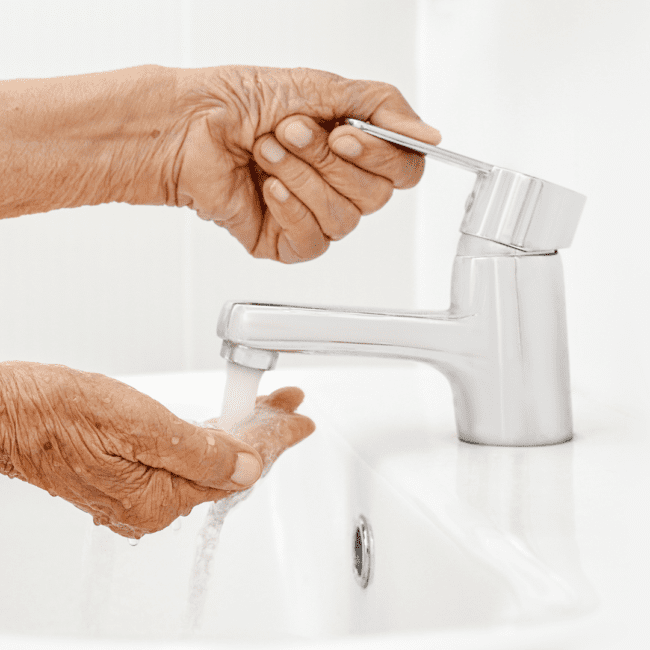With over 55 million people suffering worldwide, dementia in elderly parents is demanding more awareness and care. However, caring for parents with dementia at home is not an easy task. Seeing your father or mother gradually lose their memory can be quite disheartening.
But with timely recognition, you can ensure proper care for your parents and even slow its progression. Let’s understand what is dementia and how can you care for elderly patients with dementia at home.
What is Dementia?
Dementia is a syndrome that can happen due to several diseases affecting the nerve cells of the person. This leads to loss of memory and thinking ability. The condition gradually worsens with time and the person slowly loses control over their cognition entirely.
Memory loss can happen at any stage of life, but the term dementia is associated especially with persons over 60 to 65 years. Here biological ageing plays a significant role in the damage of the brain cells.
A study estimated around 8.8 million people over 60 years in India have dementia. This is causing a massive economic burden on the individual and government healthcare expenditure.
Stages of Dementia
Dementia is of different types, with the most common being Alzheimer’s disease and vascular dementia. Around 60 to 80% of cases of dementia happen due to Alzheimer’s disease. However, dementia has four distinct stages including;
Preclinical Stage
In this stage, changes in the brain cells occur but without any significant changes in the behaviours of the patient. This makes it impossible to detect the disease at this stage.
Worried about your Elderly parents back home?
Call us today to arrange Care Like Son and Daughter™.
Early Stage
It is during this stage that you can detect dementia in your parents for the first time. You can see symptoms like forgetting names and numbers, inability to recollect recent events and understand common concepts, etc. Recognizing these symptoms early makes caring for parents with dementia at home smoother and more manageable, especially with a proper care plan.
Mid Stage
By this stage, the disease will be more evident as the behaviours and personalities of your parents will change completely. They will become vulnerable, and leaving them on their own will no longer be possible. At this stage, dementia treatment at home requires close supervision and careful management to ensure safety.
Late Stage
In this final stage, patients lose complete control over their memory, identity and independence. They completely fail to recognise and respond to even their closest family members. Intensive hospital care or around-the-clock dementia treatment at home is needed during this stage.
The disease has physical, psychological, and social, as well as economic impacts on the people suffering from it, their caregivers, and the society at large. However, early detection of dementia can provide an opportunity to plan for future care and support.
Caring for parents with dementia at home after early detection becomes easier with some guidance.
Tips on Caring for Old People with Dementia at Home
Rapid mood swings, aggressive behaviour, and forgetfulness are inevitable in patients with dementia. However, the anxiety and stress of the closest caregiver often make the situation worse for both parties.
The disease has the potential to make you feel frustrated, agitated, and depressed about your situation. However, following these tips while caring for parents with dementia at home will ease your task a bit.
Learn about the Treatments of Dementia
There is no cure for dementia as of now, but certain treatments can slow down its pace of progression. Prescription meds like donepezil and memantine can reduce the severity of Alzheimer’s disease. Blood pressure and cholesterol control through medicines also prevent further damage to the brain cells.
Make Changes at Home to Reduce Accidents
Avoiding hazardous objects like glass and sharp knives, and covering unused electrical outlets is important when a patient with dementia is in your home. Clear the regular pathway of the patient from room to bathroom or dining place to avoid accidental falls and injuries.
Take the Help of Other Caregivers
Try to reach out to other caregivers dealing with the disease to know their experiences and get valuable advice. You can search for senior care support on your social media or ask the doctor to help you connect with the family of other patients dealing with dementia.
Regularly Consult With your Family and Friends
You might be the primary caregiver of your parent but it is always helpful to get some additional hands and minds in your support. Take help from your closest friends and family members whenever you feel the need.
Keep Yourself Updated on the Disease
Attend physical or online webinars or discussions on dementia. Read about it and its preventive and care measures online. Understanding the symptoms of dementia in each approaching stage will help you arrange better equipment and behaviour management approaches for the patient.
Prepare For the Upcoming Stages
The condition of the patients gradually worsens and it is hard to witness this happen with your close ones. Prepare your mind for this as they will need more of your attention, care, love and patience as their dementia worsens.
Take Medical Help to Slow Down the Symptoms
Timely take medical assistance to slow down the progressions of the disease. Consult with the best neurologist at your place, and get the necessary tests on time to regulate the disease. With proper medicine and assistance, you can improve their life or at least prevent it from getting worse.
Give importance to Your Mental State Too
It is very natural to feel overwhelmed, anxious and even depressed as you continuously witness the worsening conditions of your parent with dementia. If you feel you need help then seek mental health support from therapists to better manage your stress and anxiety.
Hire an In-Home Caregiver
If doing it alone is getting difficult you can hire a professional for dementia treatment at home. An in-home caregiver can efficiently help your parent dress, shower, eat, and roam around the house or nearby. You can take that time to relax or do other necessities.
Communicate with Your Parent Regularly
While caring for parents with dementia at home, you will have to maintain the flow of communication to help them feel calm and secure. Encourage two-way communication, and take the help of activities to keep their mind active. Be gentle with your words to show protectiveness.
Make a Routine of Regular Tasks for Your Parent
Make a list of everyday tasks with time and paste it into the bedroom or dining place. This will help your parent read and memorise their regular tasks. Set reminders for medicines and important appointments.
Help them Live a Healthy and Active Life
Eating healthy food with vitamins will keep their mind and body active. Make the food easy to gulp and digest considering the age of your parent. Guide them to do meditations and mini-workouts, and assist them in doing the activities they love to keep their brain cells at work.
Install CCTV Camera At Home for Constant Vigilance
With successive stages of dementia, the safety and security concerns for your parent will also increase. Installing a CCTV camera and motion sensors at the entrance of your home will help you detect and timely prevent your parents from getting lost or injured.
Take The Help of Music and Storybooks
Music can greatly aid in memory retention. Play soothing songs that your parent loves and even make him/her dance to them. Read them storybooks according to their cognitive condition, and ask questions from that story to keep their mind active.
Continuously Refresh Their Memory
Take your family album out of the cupboard and show the pictures to your elderly parent with dementia. This will help them refresh their memory. You can also paste some pictures of the nearest or most valuable persons in their bedroom to help them constantly recognise those faces.
Conclusion
Dementia treatment at home therefore requires constant vigilance, proactive measures of early intervention, and lots of patience as a caregiver. With a proper understanding of the disease, its stages and the importance of its early detection you can take immediate action upon suspicion. The above tips will hopefully help you in better caring for parents with dementia at home.







